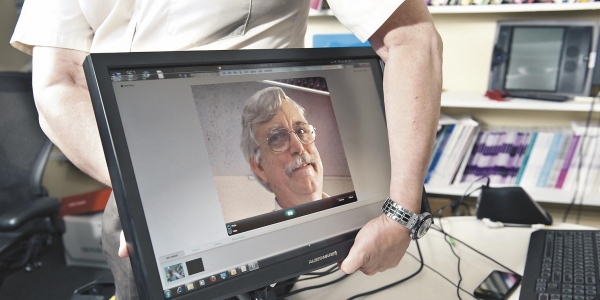Reaching the last technology holdouts at the front of the classroom — from the Chronicle by Jeff Young
Chris Dede, a professor of learning technologies at Harvard U., helped write the Department of Education’s new National Educational Technology Plan, which challenges educators to leverage modern technology to create engaging learning experiences for students.
Every semester a lot of professors’ lectures are essentially reruns because many instructors are too busy to upgrade their classroom methods.
That frustrates Chris Dede, a professor of learning technologies at Harvard University, who argues that clinging to outdated teaching practices amounts to educational malpractice.
“If you were going to see a doctor and the doctor said, ‘I’ve been really busy since I got out of medical school, and so I’m going to treat you with the techniques I learned back then,’ you’d be rightly incensed,” he told me recently. “Yet there are a lot of faculty who say with a straight face, ‘I don’t need to change my teaching,’ as if nothing has been learned about teaching since they had been prepared to do it—if they’ve ever been prepared to.”
And poor teaching can have serious consequences, he says, when students fall behind or drop out because of sleep-inducing lectures. Colleges have tried several approaches over the years to spur teaching innovation. But among instructors across the nation, holdouts clearly remain.
From DSC:
A major part of me agrees wholeheartedly with this. If a group of people are in control at an institution, those persons are responsible for the performance of the institution. So if faculty have the control at an institution, they are responsible for the results of that institution.They must take the steps to keep innovating, adapting, and must never be content w/ the status quo. (And actually, this is the case whether they are in control or not.)
Yet…another part of me struggles with loading everything on the faculty member. While I agree that we all need to keep growing, innovating, and updating our courses, I think that we are asking faculty to do too much here. They can’t keep up and neither can the instructional technologists. Few, if any, people have all the required skills nowadays. The bar has risen too high.
We need TEAMS of specialists…and that’s why the for-profit, online universities are kicking the tails of everyone else. They utilize teams to build and deliver their content.
(Michael Jordan, as good as he was, wasn’t able to beat a solid team of players. It wasn’t until he got support from other members of his own team that the Bulls went on to win multiple championships.)










I came away with the same thought. The analogy of faculty to professionals in other professions really frames it well (there are no professionals who aren’t under considerable pressure to adapt, revise and upgrade their skills, why should education be excempt? I cannot be).
Excellent point about the team approach: the challenges of increased specialization paired with the growing number of technologies available can be solved only through collaboration (and educational outcomes will be better for it).
Joe-
Very good point about the pressures that *all* of us are experiencing — to adapt and to continue growing. Why should education be spared from these pressures?
Thanks for the comment here Joe.
Daniel